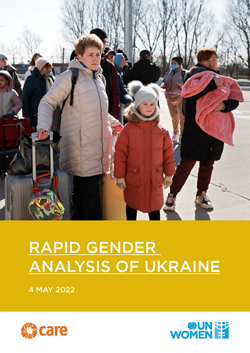On 17 May, people around the world came together to celebrate the International Day against Homophobia, Transphobia and Biphobia (IDAHOBIT) to champion inclusion and build a better world for the lesbian, gay, bisexual, transgender and intersex (LGBTI) community. In many countries, lack of adequate legal protection against discrimination on grounds of sexual orientation and gender identity exposes many LGBTI people to violations of their human rights. This is even more the case within the context of war and humanitarian crisis, as currently experienced in Ukraine.
UNAIDS and ILGA-Europe co-hosted an event, moderated by Cianán B. Russell, Senior Policy Officer, ILGA-Europe, to mark IDAHOBIT. The event brought together LGBTI representatives and a wide range of thought leaders, policymakers and practitioners.
The panellists highlighted the multiple vulnerabilities and challenges facing LGBTI people in and fleeing from Ukraine during the war. These vulnerabilities and challenges were clearly articulated by two LGBTI representatives.
“Levels of discrimination, violation of rights and hate crimes have risen in Ukraine since the start of the war. Meanwhile, no regulations or specific measures have been put in place in shelters to protect key populations. LGBTI people have no safety net since the war started,” said Olena Shevchenko, from Insight. “Go to local organizations and ask them what they need if you are intent on helping Ukraine. Ensure the accountability of humanitarian missions to fulfil the needs of the local community,” she added.
Tymur Lysenko, a Ukraine crisis consultant working for Transgender Europe, spoke about the essence of leaving no one behind, saying ““Leave no one behind” should work, not just be empty words. Trans people in Ukraine should be provided with humanitarian support, safe evacuation and access to medical care, and functioning gender recognition regulation procedures. Foster direct connections that are strong and sustainable between local organizations and international humanitarian missions. Stick to organizations that have a track record in providing direct support to LGBTI people.”
Reflecting on their own work and experiences, the panellists also reviewed the actions taken to date to protect the human rights of LGBTI people in and fleeing from Ukraine and the existing gaps within the humanitarian response and concluded with recommendations and commitment to better protect the human rights of LGBTI people staying in Ukraine or who have left.
“Humanitarian agencies must ensure that civil society organizations with expertise are included in the planning and implementation of all humanitarian assistance and in recovery efforts,” said Victor Madrigal-Borloz, a United Nations Independent Expert on Sexual Orientation and Gender Identity.
This was echoed by Kate Thomson, Head of the Community, Rights and Gender Department at the Global Fund to Fight AIDS, Tuberculosis and Malaria (Global Fund), who referred to the need for all partners to work collectively to build back resilient health and community systems. “All partners to work together to support access to HIV services in Ukraine, including those led by LGBTI communities, inside Ukraine and abroad. Let’s work collectively to help Ukraine build back better its health and community systems,” she said.
Matthew Kavanagh, UNAIDS Deputy Executive Director, a.i., spoke about the importance of maintaining and increasing the funding for the AIDS response. “We stand with the Ukrainians who are fighting so hard to make sure that their responses—the AIDS response, the community response, the rights response, the LGBTI response—are not destroyed by the moment that we are in now. There is an urgent need to move funding towards that, and an urgent need to fund the Global Fund at the same time. We cannot choose between these two things or we will end up in a less safe world—we have to do both,” he said.
Joanna Darmanin, Head of the Humanitarian Aid Thematic Policies Unit, European Union Directorate-General for European Civil Protection and Humanitarian Aid Operations, reiterated the European Union’s commitment for an inclusive humanitarian response. “Supporting Ukraine and neighbouring countries remains the priority for the European Union, and we remain committed to providing humanitarian support in an inclusive manner, taking into account the specific needs and vulnerabilities faced by the LGBTI community,” she said.
This commitment was re-echoed by Katalin Cseh, Member of the European Parliament Committee on Foreign Affairs, who pledged to fight for inclusiveness of the LGBTI community. “I pledge to fight with all my means to ensure better consultation with the LGBTI communities on the ground in Ukraine and also within the European reception area.”
Maria Arena, Chair of the European Parliament Subcommittee on Human Rights, highlighted the need to position the humanitarian response to the needs of LGBTI people, saying, “The conflict zones are putting at risk people with these vulnerabilities, so we have to be really aware of the situation and to adapt our answers for the needs of these people, including with traceability of these funds.”
Marc Angel, Co-President of the European Parliament LGBTI Intergroup, emphasized the importance of ensuring that promises made correspond with funding. “Action and money must follow words and promises,” he said.
Valeriia Rachynska, from the Global Partnership against All Forms of HIV-Related Stigma and Discrimination, spoke about the Global Partnership’s commitment to fight for and save all lives, saying, “Our main target is to save and fight for life; we will do everything in our power to save the lives of LGBTI people in Ukraine.”
Indeed, to champion and build a better world for the LGBTI community, and to end inequalities for an effective AIDS response, especially in a humanitarian crisis context, institutional actors with differing responsibilities must ensure that no one is left behind. This among others, includes directed action to: combat discrimination targeting LGBTI people and people living with HIV, rebuild or reinforce the HIV response system, meaningfully engage LGBTI civil society both in crisis planning and in crisis response systems, ensure that LGBTI-led humanitarian efforts are adequately resourced and ensure that human rights violations faced by LGBTI people are documented, investigated and result in access to justice.




